Johann Lamont: From the heat of the classroom to the heart of Scottish politics
- Published
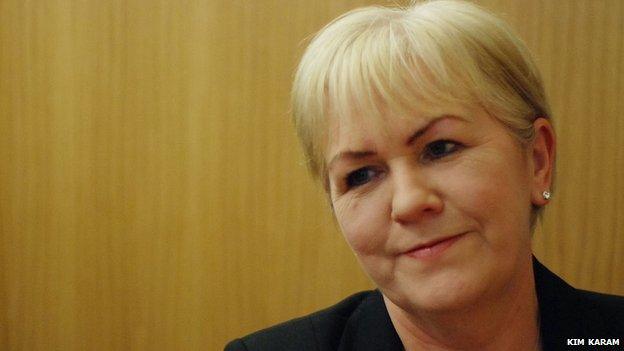
Scots Labour leader Johann Lamont says "family will always protect you from yourself"
As part of a series of conversations with high-profile women in the independence debate, Scottish Labour leader Johann Lamont speaks to the BBC's Marianne Taylor about her children, what makes her angry and her "accidental" move into frontline politics.

This year is an important one for the Lamont household.
September's independence referendum, for which Scottish Labour leader Johann Lamont is at the forefront of the campaign to keep Scotland in the UK, is not the only important event.
Her husband, Archie Graham, is the deputy leader of Glasgow City Council which is partially responsible for delivering the city's Commonwealth Games this summer.
Then there's the fact that Ms Lamont's son Colin, 16, is about to sit his Higher exams.
The politician laughs and says: "I'll be spending this parliamentary recess trying to get my son out of bed to revise."
Family is clearly at the centre of the Labour leader's life.
During the party's Scottish conference last month she was joined on stage by Archie, son Colin and her 18-year-old daughter Fay, and what can sometimes be seen by observers as a crass political stunt came across as a genuinely emotional moment for Ms Lamont and her family.
She says quite simply: "It was lovely."
Ms Lamont adds: "That was the first conference the kids had attended. Now they're 16 and 18 they've reached the stage where having a politician for a mum doesn't embarrass them. I've often thought having a politician for a parent must be like having a constantly embarrassing uncle."
Her rise as a politician coincided with the most intense years for bringing up young children.
Elected to her Glasgow seat in 1999 - defeating Tommy Sheridan in the process - Ms Lamont served as a minister in the Labour/Liberal Democrat coalition until the SNP election victory in 2007, and has led the party in Scotland since 2011.
She recalls constantly running down the Royal Mile when the parliament was temporarily housed at the Church of Scotland's General Assembly Hall from 1999 to 2004, to catch the train back to Glasgow.
Ms Lamont tells me: "I was just thinking about this recently, I used to run everywhere. My first memories of being an MSP were running down that hill at a hundred miles an hour so that I could get back home.
"My mother was alive at the time and she helped hugely, as did their other nanna.
"You have to keep your feet on the ground. It wouldn't matter what great speech you made, you had to get back in time to pick up the kids from after-school care, or get them to Brownies.
"That's a really healthy thing - family will always protect you from yourself."
Quietly spoken and more humorous in person than she comes across on television, Ms Lamont says from an early age she had a strong sense that society was unfair and unequal, that where you lived or what school you went to could determine your life chances.
Born and raised in Glasgow, she studied English at Glasgow University, where she joined the Labour Club and became involved in the women's movement.
She taught English for 20 years before being elected to Holyrood, working in schools in Rothesay on the isle of Bute, as well as Springburn and Castlemilk in Glasgow.
When did she decide to go into politics full-time?
The 56-year-old says: "I don't think I ever really made a decision as such.
"I spent ridiculous amounts of time as an activist and volunteer and was a teacher for 20 years. I didn't particularly want to go to Westminster - not that there were many seats available or chances for women to get elected. In 1987 Labour sent down 50 MPs and only one of them was a woman."
She describes being selected as the Holyrood candidate for Glasgow Pollok as "a whole series of accidents".
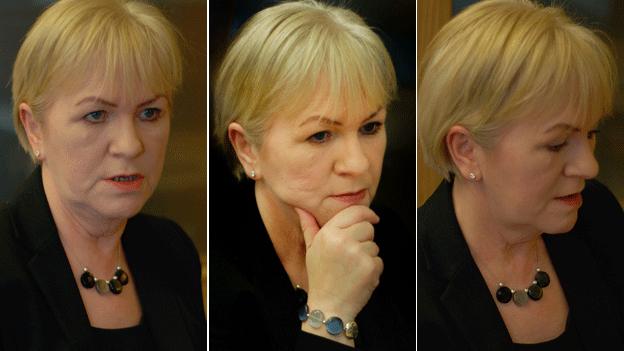
Johann Lamont: "I get angry when I think of all those children who live in misery but whose stories are never heard."
Throughout the interview, Ms Lamont talks about her time as an activist on the ground, campaigning against domestic violence, bad housing and low pay - all things that disproportionately affect women.
Research by the Scottish Social Attitudes Survey suggests that women are less likely to favour independence than men, though the gap between the genders is narrowing ahead of the referendum on 18 September.
Like two of her political opponents, deputy first minister Nicola Sturgeon, who is pro-independence, and Scottish Conservative leader Ruth Davidson, who is pro-Union, Ms Lamont is careful to avoid stereotyping women, and the reasons why they choose to support a "Yes" or "No" vote. But she says the figures do raise questions.
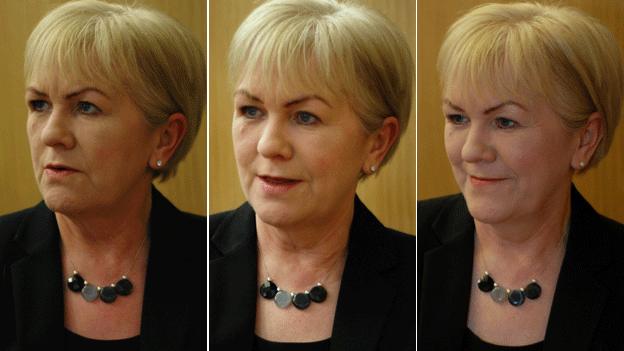
Johann Lamont: "We have made unbelievable progress [on rights for women] in my lifetime, but much still to do"
Ms Lamont explains: "I'm resistant to the idea that women are less bold, or on the 'No' side, that they are only concerned about their children - that panders to another stereotype.
"Perhaps women are more sceptical. One of the fundamental problems for the Yes campaign is saying everything will be better. It's just not credible.
"It's interesting, Westminster welfare cuts are often used [by the Yes campaign] as an argument for independence.
"I have grave reservations about much of what is being done at Westminster and indeed I recently attended an event talking about how welfare reform disproportionately hits women.
"There's an argument that says independence should therefore be more attractive to them, but why isn't that the case?
"Maybe women are more likely to be in low-paid jobs, more likely to be lone parents, perhaps it's because women make up more of those groups for whom risk is a bigger problem."
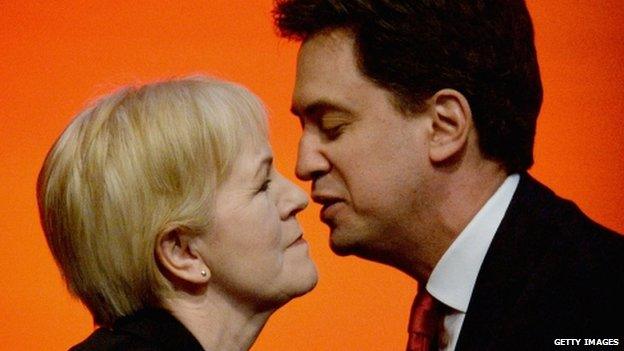
Johann Lamont greets Labour leader Ed Miliband who spoke at this year's Scottish Labour spring conference
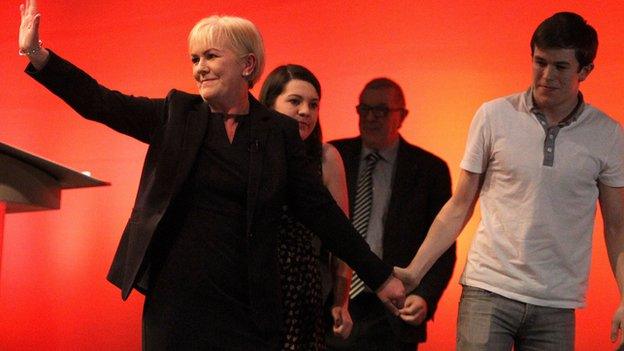
At the end of Johann Lamont's conference speech, she was joined by husband Archie, son Colin and daughter Fay
Ms Lamont says constituency work is the part of the job she enjoys most, the one-to-one contact with people and the ability to help them sort out their problems.
She says: "You can give them a voice and that's very powerful. You can also take things into the political domain and get the satisfaction of changing the system. The wee things matter - they will always matter to me, no matter what I'm doing.
"Someone came to one of my surgeries recently to discuss her mother's care. I asked how long the carer stayed with her mum and she said 'until the ping of the microwave'. It's like a line from a play - it tells you everything you need to know about that situation in half a dozen words."
But a passion for constituency work doesn't mean Ms Lamont lacks ambition. Asked whether she would like to be first minister, there is no hesitation. "I wouldn't be doing this job unless I thought that was possibility," she says.
Johann Lamont: "I grew up in Anderson in Glasgow, but my heart was in Tiree."
She describes her party, which suffered huge losses to the SNP at the 2011 Holyrood elections, as a "work in progress" and says she is frustrated that the current focus on the referendum debate is, in her view, detracting from progress on social justice issues.
So, how does she deal with the stress and frustration of a high-profile political life?
"When my head is exploding I just go to the gym.
"And I watch Coronation Street. I got quite excited recently because Masterchef is back.
"Once I get home, it's a different world."